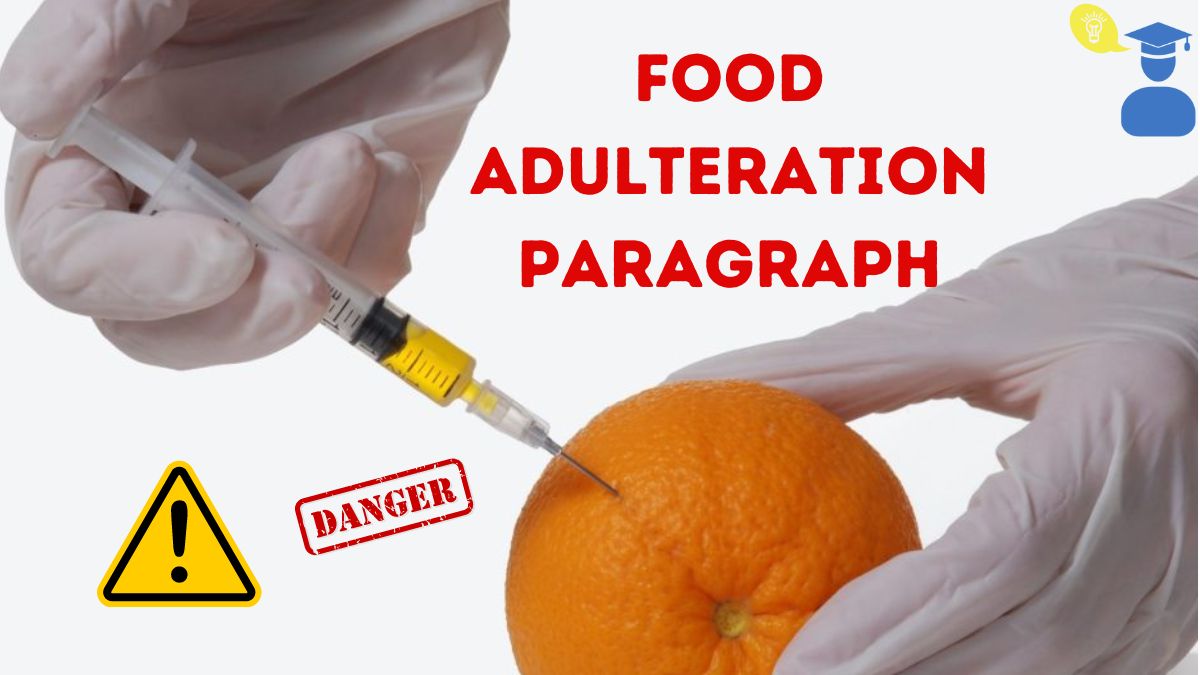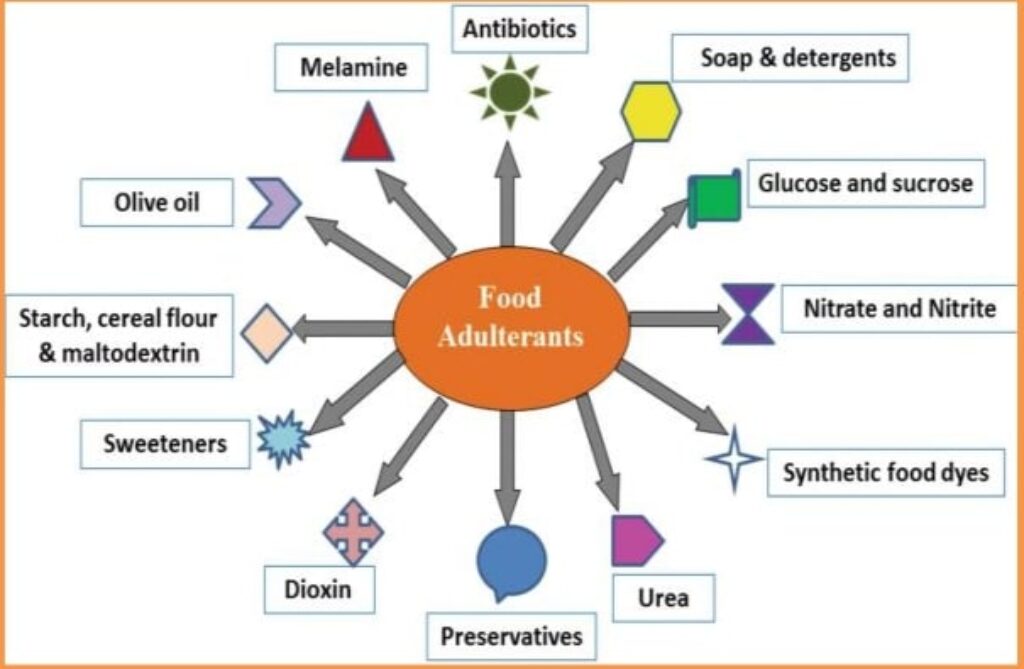Food Adulteration Paragraph for Class 6-10, SSC & HSC

Eating pure and fresh food is important for good health. But some sellers mix harmful chemicals to food just to earn more money. This is called food adulteration. They mix things like formalin, colors and cheap oil to fish, milk, vegetables and other eatables. Though the food looks and smells normal, the chemicals can cause cancer, liver disease and other serious illnesses if we keep eating such food.
The government should punish those who do this dangerous adulteration. Schools must teach children not to eat foods that look too bright red, shiny or unnaturally fresh. We too should check expiry dates carefully before buying eatables. Our health is more vital than sellers’ profits. Everyone together must fight to stop this life-threatening adulteration problem. Pure food is our right for a healthy life. As it has many important implications in our life, it is discussed as a Food Adulteration Paragraph in detail below.
Write a Paragraph on Food Adulteration
Food Adulteration Paragraph
Food adulteration has become an alarming public health issue today. It refers to the intentional addition, substitution or removal of essential ingredients from food products for financial gains without concern for human health. Various toxic chemicals and inferior substitutes are used by unscrupulous manufacturers and suppliers to cut costs or enhance profit margins. Studies indicate widespread adulteration practices across common food categories – fruits, vegetables, milk, meat, spices, oils etc.
The drivers of food adulteration are greed for higher profits, lack of moral ethics, regulatory gaps, high demand-supply gaps and ignorance among consumers. Toxic chemicals like formalin, carbide, textile dyes are used by traders for ripening or preserving fruits/vegetables to keep them attractive for longer periods. Milk and dairy products are adulterated with detergents, starch, glucose, urea etc which pose kidney problems. Filler ingredients like argemone seeds, kesari dal are mixed with mustard oil or ghee to increase volume. Meat can contain harmful steroid residues. Fish/prawns are preserved using formalin, which is a cancer-causing chemical. Even everyday foods like pulses or rice are not spared and can contain tiny stones/pebbles.
The health impacts of ingesting such adulterated foods can be disastrous – ranging from diarrhoea, food poisoning to developing chronic ailments like cancer, renal failure or liver cirrhosis. Adulterants can be genotoxic, neurotoxic or carcinogenic in nature. Children are even more vulnerable to toxicity impacts. Moreover, storage, supply and consumption of toxic adulterated foods increase antimicrobial resistance in the environment. They also cause malnutrition due to loss of nutrients. Unfortunately creating awareness is a major challenge as visual differentiation is difficult.
Urgent, collective steps are needed to curb food adulteration including improving food safety systems, stringent norms for additives, upgraded testing infrastructure to identify adulterants quickly, strict penalties for violations, raising consumer awareness on risks and ensuring ethical, responsible conduct by businesses. Without a committed focus on eliminating this unethical practice which plays with human lives for greed, achieving food safety, food security and public health goals will remain an uphill task. It calls for zero tolerance along with a moral conscience against profits at the cost of health.
Food Adulteration Paragraph Bangla Meaning
খাদ্যে ভেজাল আজ একটি উদ্বেগজনক জনস্বাস্থ্য সমস্যা হয়ে দাঁড়িয়েছে। এটি মানব স্বাস্থ্যের জন্য উদ্বেগ ছাড়াই আর্থিক লাভের জন্য খাদ্য পণ্য থেকে প্রয়োজনীয় উপাদানগুলি ইচ্ছাকৃত সংযোজন, প্রতিস্থাপন বা অপসারণকে বোঝায়। বিভিন্ন বিষাক্ত রাসায়নিক এবং নিম্নমানের বিকল্পগুলি অসাধু নির্মাতা এবং সরবরাহকারীরা খরচ কমাতে বা লাভের মার্জিন বাড়াতে ব্যবহার করে। অধ্যয়নগুলি সাধারণ খাদ্য বিভাগ – ফল, শাকসবজি, দুধ, মাংস, মশলা, তেল ইত্যাদি জুড়ে ব্যাপক ভেজাল অনুশীলন নির্দেশ করে।
খাদ্যে ভেজালের চালকরা বেশি মুনাফার লোভ, নৈতিকতার অভাব, নিয়ন্ত্রণের ফাঁক, উচ্চ চাহিদা-সরবরাহের ব্যবধান এবং ভোক্তাদের মধ্যে অজ্ঞতা। ফরমালিন, কার্বাইড, টেক্সটাইল রঞ্জক জাতীয় বিষাক্ত রাসায়নিকগুলি ব্যবসায়ীরা ফল/সবজি পাকা বা সংরক্ষণের জন্য ব্যবহার করে যাতে দীর্ঘ সময়ের জন্য আকর্ষণীয় থাকে। দুধ ও দুগ্ধজাত পণ্যে ভেজাল থাকে ডিটারজেন্ট, স্টার্চ, গ্লুকোজ, ইউরিয়া ইত্যাদি যা কিডনির সমস্যা তৈরি করে। ভলিউম বাড়াতে সরিষার তেল বা ঘি দিয়ে মেশানো হয় আর্জেমোন বীজ, কেশরি ডালের মতো ফিলার উপাদান। মাংসে ক্ষতিকারক স্টেরয়েডের অবশিষ্টাংশ থাকতে পারে। ফরমালিন ব্যবহার করে মাছ/চিংড়ি সংরক্ষণ করা হয়, যা ক্যান্সার সৃষ্টিকারী রাসায়নিক। এমনকি প্রতিদিনের খাবার যেমন ডাল বা ভাতও রেহাই পায় না এবং এতে ছোট পাথর/নুড়ি থাকতে পারে।
এই জাতীয় ভেজাল খাবার খাওয়ার স্বাস্থ্যের প্রভাবগুলি বিপর্যয়কর হতে পারে – ডায়রিয়া, ফুড পয়জনিং থেকে শুরু করে ক্যান্সার, রেনাল ফেইলিওর বা লিভার সিরোসিসের মতো দীর্ঘস্থায়ী অসুস্থতা। ভেজাল জিনোটক্সিক, নিউরোটক্সিক বা কার্সিনোজেনিক প্রকৃতির হতে পারে। শিশুরা বিষাক্ত প্রভাবের জন্য আরও বেশি ঝুঁকিপূর্ণ। তদুপরি, বিষাক্ত ভেজাল খাবার সংরক্ষণ, সরবরাহ এবং সেবন পরিবেশে জীবাণুরোধী প্রতিরোধ ক্ষমতা বাড়ায়। পুষ্টির ক্ষতির কারণে তারা অপুষ্টিও সৃষ্টি করে। দুর্ভাগ্যবশত সচেতনতা তৈরি করা একটি বড় চ্যালেঞ্জ কারণ চাক্ষুষ পার্থক্য করা কঠিন।
খাদ্য নিরাপত্তা ব্যবস্থার উন্নতি, সংযোজনকারীর জন্য কঠোর নিয়ম, দ্রুত ভেজাল শনাক্ত করার জন্য উন্নত পরীক্ষার পরিকাঠামো, লঙ্ঘনের জন্য কঠোর শাস্তি, ঝুঁকি সম্পর্কে ভোক্তাদের সচেতনতা বৃদ্ধি এবং ব্যবসার দ্বারা নৈতিক, দায়িত্বশীল আচরণ নিশ্চিত করা সহ খাদ্যে ভেজাল রোধে জরুরী, সম্মিলিত পদক্ষেপের প্রয়োজন। এই অনৈতিক অভ্যাস যা লোভের জন্য মানুষের জীবন নিয়ে খেলা করে তা নির্মূল করার প্রতি প্রতিশ্রুতিবদ্ধ ফোকাস ছাড়া, খাদ্য নিরাপত্তা, খাদ্য নিরাপত্তা এবং জনস্বাস্থ্য লক্ষ্য অর্জন একটি কঠিন কাজ থেকে যাবে। এটি স্বাস্থ্যের মূল্যে লাভের বিরুদ্ধে নৈতিক বিবেকের সাথে শূন্য সহনশীলতার আহ্বান জানায়।
Food Adulteration Paragraph English & Bangla Pdf
Food Adulteration Paragraph Class 6 – 150 Words Easy
Food adulteration has become a burning issue as unscrupulous manufacturers intentionally contaminate food to cut costs. Common adulteration practices include mixing toxic chemicals like formalin, carbide, textile dyes into fruits, vegetables, fish, milk and other eatables to extend shelf life. This poses grave health hazards.
Studies reveal the addition of harmful thickening agents in milk products, toxic argemone oil in mustard oil, filler ingredients like kesari dal in pulses, artificial flavors and colors in sweets and juices. Such toxic substances can lead to cancer, liver/kidney damage, gastrointestinal issues if ingested regularly. However, visual differentiation is often difficult. Combating food adulteration calls for spreading awareness on risks, Improved food surveillance systems, upgraded testing infrastructure to rapidly detect adulterants, stringent penalties on offenders, and ethical business practices. Safeguarding consumer health should get priority over profit margins. Collective action is needed to eliminate this food safety menace from its roots.

Food Adulteration Paragraph Class 9 (250 Words)
Food adulteration means purposefully mixing harmful things in eatables to increase quantity and profits. Different chemicals, low quality ingredients and colours are added to fruits, vegetables, milk, oil, fish and other food. For example, formalin is put in fish and carbide in fruits to keep them fresh longer. Some shopkeepers mix water in milk or cheap oils in expensive ones. They do this only to earn more money even if it is harmful for health.
Eating adulterated food can cause stomach pains, cancer, liver, kidney and heart diseases. Even some colours, sweets and spices we use daily can have poisonous things. So we must be very careful. The government should check all food factories, shops and fine those who make adulterated food. Teachers must tell students about this in school. If everyone is careful, then no one can sell bad quality food and make people sick. All of us should try together to stop this dangerous adulteration. Our health is more important than a shopkeeper’s extra profit.
Food Adulteration in Bangladesh Paragraph
Food adulteration is a significant concern in Bangladesh, impacting the health and well-being of its citizens. The practice involves the addition of inferior substances to food items, often driven by the pursuit of profit by unscrupulous individuals. Commonly adulterated foods in Bangladesh include fruits, vegetables, spices, cooking oil, fish, milk, and dairy products.
The root causes of food adulteration in Bangladesh are multifaceted. Economic pressures and the desire for higher profits incentivize dishonest traders to adulterate food products with harmful substances. Additionally, inadequate regulatory enforcement and oversight contribute to the widespread prevalence of this issue.
Various harmful chemicals and additives, such as formalin, carbide, and textile dyes, are frequently used to preserve and enhance the appearance of food items. However, consumption of these adulterated foods poses serious health risks to consumers, including gastrointestinal disorders, organ damage, and long-term health complications.
Efforts to address food adulteration in Bangladesh require a multi-pronged approach. Strengthening regulatory frameworks, increasing enforcement measures, and enhancing public awareness are essential steps in combating this pervasive problem. Government agencies must collaborate with stakeholders across the food supply chain to implement effective monitoring and inspection mechanisms.
Furthermore, educating consumers about the risks associated with adulterated foods and empowering them to make informed choices is crucial. By fostering transparency and accountability within the food industry, Bangladesh can work towards ensuring the availability of safe and nutritious food for its population. Ultimately, concerted efforts at the governmental, societal, and individual levels are necessary to mitigate the adverse effects of food adulteration and safeguard public health in Bangladesh.
Food Adulteration Paragraph for HSC
Food adulteration is a very scary public health problem. It means adding, replacing, or taking away important ingredients from food products on purpose to make more money without caring about people’s health. Manufacturers and sellers who aren’t honest use a wide range of harmful chemicals and cheap alternatives to cut costs and make more money. Studies show that common types of food, like fruits, veggies, milk, meat, spices, oils, and so on, are often tampered with.
Food adulteration is caused by people who want to make more money, people who don’t care about morals, regulatory gaps, high demand-supply gaps, and customers who don’t know any better. Traders use harmful chemicals like formalin, carbide, and textile dyes to ripen or store fruits and veggies so they look good for longer. Detergents, starch, glucose, urea, and other chemicals that are added to milk and other dairy products can damage your kidneys. To make it more filling, mustard oil or ghee is mixed with things like argemone seeds and kesari dal. Meat may have dangerous steroid residues in it. Formalin, a chemical that causes cancer, is used to keep fish and shrimp fresh.
Small stones or rocks can be found in even everyday foods like rice or beans. Eating these tampered foods can be very bad for your health, causing everything from diarrhea and food poisoning to long-term illnesses like cancer, kidney failure, and liver disease. Adulterants can damage genes, hurt nerves, or cause cancer. Children are even more likely to be hurt by harmful effects. Also, storing, selling, and eating foods that have been tampered with to make them poisonous makes the environment more resistant to antibiotics. They also make people malnourished because they take away minerals. Visual difference makes it hard to raise awareness, which is a big problem.
To stop people from adulterating food, we need to take immediate, coordinated action. This includes strengthening food safety systems, setting strict rules for additives, enhancing testing facilities to quickly find adulterants, enforcing strict penalties for violations, educating consumers about risks, and making sure businesses act in an honest, responsible way. As long as this evil practice that risks people’s lives for money is not stopped, it will be hard to reach our goals for food safety, food security, and public health. No patience is called for, along with a moral outrage against making money at the expense of health.
Food Adulteration Paragraph in 200 Words
Food adulteration is a pressing issue in Bangladesh, impacting the health and safety of its population. This unethical practice involves the addition of harmful substances to food items for economic gain. Commonly adulterated foods include fruits, vegetables, spices, cooking oil, fish, milk, and dairy products. The prevalence of food adulteration is fueled by various factors, including the pursuit of higher profits, inadequate regulatory oversight, and the use of harmful chemicals and additives.
Consumption of adulterated foods poses significant health risks, ranging from gastrointestinal problems to long-term illnesses such as cancer and organ damage. Addressing this issue requires concerted efforts from government agencies, law enforcement authorities, and the public. Strengthening regulatory frameworks, increasing enforcement measures, and raising awareness among consumers are essential steps in combating food adulteration in Bangladesh.
By implementing stringent measures to monitor and regulate the food supply chain, Bangladesh can mitigate the adverse effects of food adulteration and ensure the availability of safe and nutritious food for its citizens. Additionally, fostering a culture of transparency and accountability within the food industry is crucial for building trust and safeguarding public health.
Food Adulteration Paragraph in 200 Words Bangla Meaning
খাদ্যে ভেজাল বাংলাদেশের একটি গুরুত্বপূর্ণ বিষয়, যা এর জনসংখ্যার স্বাস্থ্য ও নিরাপত্তাকে প্রভাবিত করে। এই অনৈতিক অভ্যাসের সাথে অর্থনৈতিক লাভের জন্য খাদ্য সামগ্রীতে ক্ষতিকারক পদার্থ যোগ করা জড়িত। সাধারণত ভেজাল খাবারের মধ্যে রয়েছে ফল, শাকসবজি, মশলা, রান্নার তেল, মাছ, দুধ এবং দুগ্ধজাত পণ্য। খাদ্যে ভেজালের প্রাদুর্ভাব বিভিন্ন কারণের দ্বারা উদ্বুদ্ধ হয়, যার মধ্যে উচ্চ মুনাফা অর্জন, অপর্যাপ্ত নিয়ন্ত্রক তদারকি এবং ক্ষতিকারক রাসায়নিক ও সংযোজন ব্যবহার।
ভেজাল খাবার খাওয়ার ফলে গ্যাস্ট্রোইনটেস্টাইনাল সমস্যা থেকে শুরু করে ক্যান্সার এবং অঙ্গের ক্ষতির মতো দীর্ঘমেয়াদী অসুস্থতা পর্যন্ত উল্লেখযোগ্য স্বাস্থ্য ঝুঁকি তৈরি হয়। এই সমস্যাটির সমাধানের জন্য সরকারী সংস্থা, আইন প্রয়োগকারী কর্তৃপক্ষ এবং জনসাধারণের সমন্বিত প্রচেষ্টা প্রয়োজন। বাংলাদেশে খাদ্যে ভেজাল মোকাবেলায় নিয়ন্ত্রক কাঠামো শক্তিশালী করা, প্রয়োগের ব্যবস্থা বৃদ্ধি এবং ভোক্তাদের মধ্যে সচেতনতা বৃদ্ধি করা অপরিহার্য পদক্ষেপ।
খাদ্য সরবরাহ শৃঙ্খল পর্যবেক্ষণ ও নিয়ন্ত্রণের জন্য কঠোর ব্যবস্থা বাস্তবায়নের মাধ্যমে বাংলাদেশ খাদ্যে ভেজালের বিরূপ প্রভাব প্রশমিত করতে পারে এবং নাগরিকদের জন্য নিরাপদ ও পুষ্টিকর খাদ্যের প্রাপ্যতা নিশ্চিত করতে পারে। উপরন্তু, খাদ্য শিল্পের মধ্যে স্বচ্ছতা ও জবাবদিহিতার সংস্কৃতি গড়ে তোলা আস্থা তৈরি এবং জনস্বাস্থ্য রক্ষার জন্য অত্যন্ত গুরুত্বপূর্ণ।
Food Adulteration Paragraph in 200 words PDF download
You can read here – Traffic Jam Paragraph







